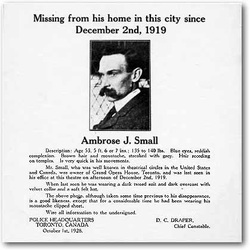So Erika asked in class the other day, "Who is the majority in Canada?" Paul said, "Well, there's no white male in our class. Otherwise I would point at him." Right, white male = majority. How can I forget about that? Living in Vancouver in the year of 2010, I shop at Korean supermarkets, order take-outs in Japanese restaurants, go to African music concerts, and being surrounded by more Asian girls than white dudes at UBC. I guess it's normal that I forget about that. Not Ondaatje in the year of 1987 though. I bet he was reminded that every day. Yet In the Skin of a Lion, as I read it in year 2010, still reminds me of my neighbours and colleagues.
In the eyes of Michael Ondaatje, the 1920s Ontario was a place where many boundaries were being crossed. People have crossed political boundaries - the Finnish loggers in rural Ontario, Nicholas Temelcoff the Macedonian daredevil who became a bakery owner, Caravaggio the Italin-Canadian. Social classes were being crossed - Harris the white-collared commissioner being threatened by Patrick the blue-collared worker. Social justices being crossed - Caravaggio broke out of the prison. Religious boundaries being crossed - Alice the nun ran way after the Bridge incident. Even the Bridge itself is a symbol of crossing a geographical boundary.
These crossing of boundaries were Ondaatje's answers to the sought-after Canadian identity being defined by Anglo-Saxons who sat in offices and wrote books. Jody Mason told us,
"Using the irony of historiographic metafiction and documentary, Ondaatje asks how we know a nation’s history (and, by extension, its culture and identity) and implies that the version we commonly tell ourselves is constructed from the point of view of men like the Toronto Commissioner of Public Works r.C. Harris — wealthy, powerful, Anglo-Saxons ("The animals out of the desert": The Nomadic Metaphysics of Michael Ondaatje's In the Skin of a Lion. Studies in Canadian Literature. 31(2).)"
In the eyes of Michael Ondaatje, the 1920s Ontario was a place where many boundaries were being crossed. People have crossed political boundaries - the Finnish loggers in rural Ontario, Nicholas Temelcoff the Macedonian daredevil who became a bakery owner, Caravaggio the Italin-Canadian. Social classes were being crossed - Harris the white-collared commissioner being threatened by Patrick the blue-collared worker. Social justices being crossed - Caravaggio broke out of the prison. Religious boundaries being crossed - Alice the nun ran way after the Bridge incident. Even the Bridge itself is a symbol of crossing a geographical boundary.
These crossing of boundaries were Ondaatje's answers to the sought-after Canadian identity being defined by Anglo-Saxons who sat in offices and wrote books. Jody Mason told us,
"Using the irony of historiographic metafiction and documentary, Ondaatje asks how we know a nation’s history (and, by extension, its culture and identity) and implies that the version we commonly tell ourselves is constructed from the point of view of men like the Toronto Commissioner of Public Works r.C. Harris — wealthy, powerful, Anglo-Saxons ("The animals out of the desert": The Nomadic Metaphysics of Michael Ondaatje's In the Skin of a Lion. Studies in Canadian Literature. 31(2).)"

 RSS Feed
RSS Feed